NSU Hosts Groundbreaking Presentation on Virtual Reality in Medical Education
The recent Raising the Bar: Educating the Modern Learner conference, hosted by NSU, brought together educators from across the globe to explore innovative strategies for enhancing academic standards and engaging today’s diverse student body. Among the event’s highlights was a groundbreaking session titled “Using Virtual Reality for Immersive Learning in Medical Physiology,” presented by Dr. Imaan Benmerzouga and Dr. Elizabeth Owiawe.
This dynamic presentation showcased the transformative potential of virtual reality (VR) technology and tools like 3D Organon, in advancing medical education and improving student outcomes.
Key Highlights from the Session:
- Engagement & Performance Boost:
By incorporating 3D Organon and VR into the Medical Physiology course at NSU’s KPCOM, first-year medical students demonstrated significant performance improvements, particularly in mastering complex topics such as the autonomic nervous system. - Cutting-Edge Technology:
Platforms like 3D Organon and Acadicus VR transitioned students from traditional passive learning to immersive, interactive experiences, enabling them to explore anatomy and physiology in a realistic virtual environment. - Strategic Integration of VR:
Dr. Elizabeth Owiawe emphasized the importance of selecting specific curriculum areas where VR can have the most significant impact, ensuring its use maximizes both engagement and understanding.
Spotlight on 3D Organon
A standout feature of the session was the demonstration of the 3D Organon Search Tool, which empowers educators to break down complex medical concepts into accessible and interactive lessons. Its visual capabilities provide students with an unparalleled opportunity grasp intricate anatomy and physiology topics in a way traditional methods cannot.
Key Learning Outcomes:
- Insights into how VR enhances medical education through active, immersive learning.
- Strategies for pinpointing curriculum areas most suited for VR implementation.
- Effective methods for assessing the impact of VR on student learning outcomes.
Looking Ahead
This pilot initiative highlights the transformative role immersive technologies like 3D Organon can play in reshaping medical education. The success of this program underscores the growing demand for tools that engage students in active, hands-on learning.
With plans to expand VR integration into additional courses in 2025, 3D Organon remains committed to supporting educators and institutions in unlocking new possibilities for teaching complex medical concepts.
We applaud Dr. Imaan Benmerzouga and Dr. Elizabeth Owiawe for their pioneering efforts and dedication to advancing the educational experience.
For more inquiries, contact: [email protected]

